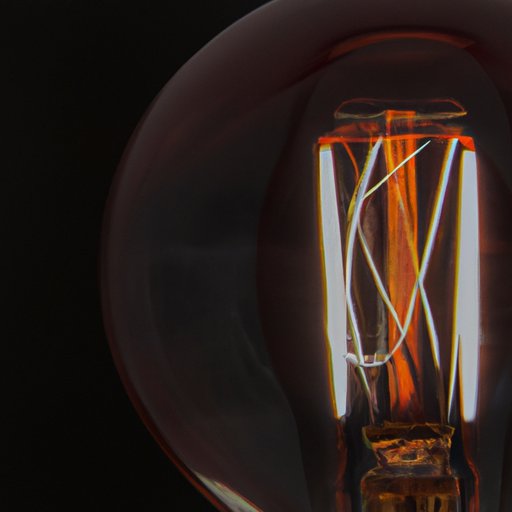Introduction
Thomas Edison is one of America’s most renowned inventors, responsible for countless inventions that have changed the course of history. One of his most famous inventions is the lightbulb. But why did Edison invent the lightbulb? This article will explore the life of Thomas Edison and how his childhood education and career as an inventor led to the invention of the lightbulb. It will examine the impact of this invention on society, Edison’s experiments with electricity, and the scientific principles behind the invention.
Exploring Edison’s Early Life and How It Led to the Invention of the Lightbulb
Thomas Edison was born in 1847 in Milan, Ohio, to a family of modest means. Growing up, he received only a few months of formal schooling, but his mother taught him to read and write at home. Edison had a thirst for knowledge and a fascination with science from a young age. He was particularly interested in chemistry, and would often experiment with various concoctions in his mother’s kitchen.
At the age of 15, Edison began working as a telegraph operator in Port Huron, Michigan. During this time, he continued to pursue his passion for science, experimenting with electricity and building a small laboratory in his room. Eventually, Edison left his job as a telegraph operator and moved to New York City, where he established himself as a successful inventor.
In 1878, Edison began experimenting with electric lighting and developed a prototype for the first incandescent lightbulb. After several months of experimentation, Edison succeeded in inventing a bulb that could produce a steady, bright light. This marked the beginning of Edison’s journey to conquer the darkness with a bright idea.

Examining the Impact of the Lightbulb on Society
The invention of the lightbulb had a profound impact on society. Before its invention, homes were lit by candles or gas lamps, both of which posed certain dangers. The lightbulb was a safer and more reliable source of light, and it allowed people to extend their activities into the evening hours. It also made indoor spaces much brighter and more comfortable.
The invention of the lightbulb also had a major impact on business and industry. The ability to work at night opened up new possibilities for factories and other workplaces, allowing them to increase production and operate more efficiently. The lightbulb also made it possible to safely illuminate streets and public spaces, which improved public safety.
How Edison’s Inventions Transformed Our Understanding of Electricity
In addition to inventing the lightbulb, Edison also made significant contributions to our understanding of electricity. His early experiments helped to lay the groundwork for electrical distribution systems. He also invented the phonograph, the motion picture camera, and the electric power generator. These inventions helped to revolutionize the way we use and understand electricity.
Edison’s inventions also paved the way for the development of modern electrical appliances, such as televisions, radios, and computers. Without Edison’s contributions, these devices would not exist today.
An Analysis of the Science Behind the Invention of the Lightbulb
The invention of the lightbulb was the result of a complex combination of scientific principles. Edison used a variety of materials to create the filament, including bamboo, platinum, and carbonized paper. He also experimented with different vacuum pumps to create a vacuum inside the bulb, which prevented the filament from burning out too quickly.
Edison’s experiments with electricity also played a key role in the invention of the lightbulb. He was able to harness the power of electricity to create a steady, bright light. This was a major breakthrough, as it enabled people to have access to light in the evenings and at night.
The Story of Edison’s Quest to Conquer the Darkness with a Bright Idea
Edison was determined to conquer the darkness with a bright idea. He was driven by a desire to improve people’s lives, and he believed that the lightbulb could do just that. He faced many challenges along the way, including financial difficulties and technical obstacles. However, Edison persevered and eventually succeeded in inventing the lightbulb.
Edison’s triumph was a major milestone in human history. The invention of the lightbulb transformed the way we live, work, and play. It provided us with a safe and reliable source of light, and enabled us to extend our activities into the night. It also helped to illuminate public spaces and make them safer.
Conclusion
Thomas Edison’s invention of the lightbulb was a major milestone in human history. It transformed the way we use and understand electricity, and it had a profound impact on society. It allowed us to extend our activities into the evening hours and illuminated public spaces, making them safer. Edison’s legacy is one of innovation and perseverance, and his lightbulb continues to be an integral part of our lives today.
(Note: Is this article not meeting your expectations? Do you have knowledge or insights to share? Unlock new opportunities and expand your reach by joining our authors team. Click Registration to join us and share your expertise with our readers.)
